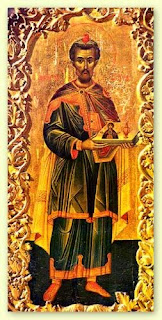Akathist of Thanksgiving
Many Orthodox parishes around the country will use this recent prayer service during the celebration of American Thanksgiving. This is a beautiful service of prayer that was penned only recently (1940's). The following is an account of its author (Hieromartyr Gregory Petroff) and composition: " The Archpriest Gregory Petroff was a man who lived and died under this madness. How can we understand the senseless cruelty and slaughter that took place in Communist Russia? We can only by faith in God’s eternal and saving providence. “Remember the word that I said to you, ‘A servant is not greater than his master. If they persecuted me, they will persecute you’” (John 15:20). It is said that Fr. Gregory was murdered while in a prison camp, but not before he was able to pen the poignant AKATHIST OF THANKSGIVING, giving to the Church and to the world light from great darkness, reminding us that even in the midst of frightful suffering true Christian conviction and courage ar




